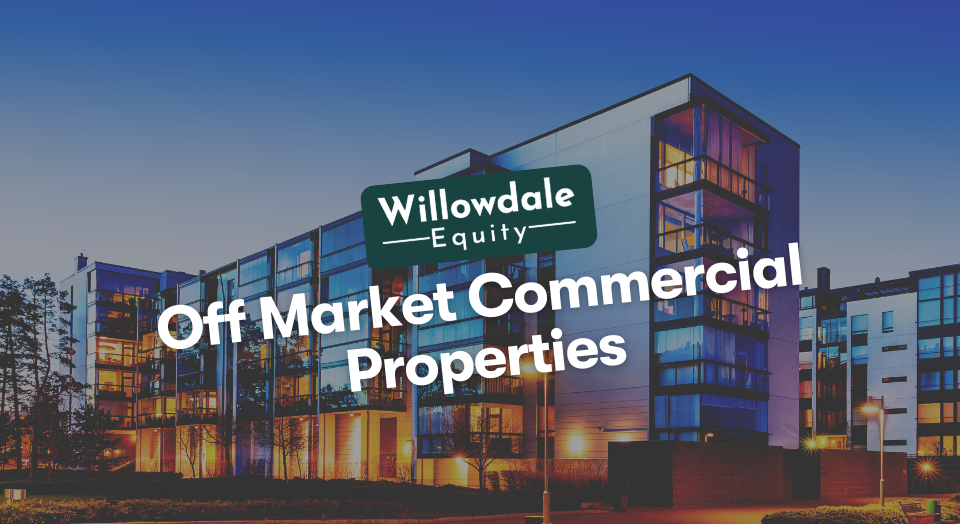
Off Market Commercial Properties: Why they Should be a Core Piece of Your Real Estate Investing Business
This article is part of our passive investors guide on real estate syndications, available here.
Do you want to build substantial wealth to last generations? Commercial real estate could be the key instrument to achieving your financial and investment goals.
Most common types of commercial real estate include multifamily, warehouses, office buildings, retail, and shopping malls.
In today’s blog post, we’ll look at why you should consider focusing on sourcing off-market commercial real estate. First, let’s look at the difference between on-market and off-market CRE.
Key Takeaways
-
Off market properties mean less competition from other investors interested in the property. On-market deals tend to have high demand, especially if they are in excellent condition, which in turn drives the price up.
-
Off-market commercial properties also allow you to save money. Since there’s no broker involved, you won’t have to pay any commissions once the transaction is complete.
-
Off-market property sellers don’t put much pressure on interested buyers since there’s no time pressure, although that’s deal-dependent.
On-Market vs. Off-Market CRE
On-market properties are property listings actively listed on public platforms. These properties are listed publicly by a broker or the owner to encourage potential commercial real estate investors to make offers.
Common platforms for on-market properties include Loopnet, the MLS, Facebook Marketplace, Zillow, Craigslist, and many others.
On the other hand, off-market commercial properties are sold to investors without hitting the public market. In short, they’re sold without the public knowing they were ever for sale. They’re not listed on websites nor have for sale signs in the yards.
In fact, some off-market property owners aren’t even looking to sell. It’s up to you to spot a potential investment property with great prospects, reach out to the owner and convince them to sell it to you.
Off-market properties are often referred to as pocket listings. This is because the owner may have thought of selling the property but is keeping it until they find the right deal with the right numbers. You must think outside the box, find potential deals, and present a fair and equitable offer for you and the seller.
So, why should you consider off-market commercial properties?
The Advantages to Sourcing Off-Market Commercial Real Estate
It’s easy to see why sellers avoid listing their properties publicly. They usually do so to prevent hefty commissions from commercial real estate brokers and agents, steer clear of buyers who aren’t ready to make a purchase, and avoid unnecessary attention from the listing.
So, what’s in it for the buyer?
There are some significant benefits of sourcing off-market CRE. They include:
1.) Better Position to Negotiate

Off market properties mean less competition from other investors interested in the property. On-market deals tend to have high demand, especially if they are in excellent condition, which in turn drives the price up. On-market sellers tend to have the upper hand in the negotiations (depending on what phase of the market cycle your in), so you might not get the best deal.
This isn’t the case with off-market properties. You’ll have better negotiating ability when you’re the only buyer speaking to the seller. Less competition means no bidding wars, allowing you to negotiate from a position of leverage.
Also, off-market deals don’t require you to work with a broker or agent. You speak directly to the owner without passing the information to an intermediary. Meaning there’s no breakdown of communication. Communication is crucial in creating a seamless negotiation process.
2.) Better Terms
Property owners who list their properties on the MLS and other listing platforms usually expect a fast sale. This isn’t the case with off-market commercial properties. Off-market property sellers don’t put much pressure on interested buyers since there’s no time pressure, although that’s deal-dependent.
Investors love off-market properties since they can negotiate for better terms. You don’t have to rush closing the property to beat other investors. You can also arrange for flexible inspection dates and seller financing.
One significant benefit is having more time to perform due diligence. You’ll take your time to thoroughly ensure the inspections are done and calculate the expected return on investment before making an offer.
However, keep in mind that this advantage may not always apply. Some off-market deals, such as distressed sales, pre-foreclosures, and foreclosures, may need to close fast. Ultimately, it depends on how you negotiate and the terms the seller is flexible with.
3.) Save on Fees
Off-market commercial properties also allow you to save money. Since there’s no broker involved, you won’t have to pay any commissions once the transaction is complete.
While real estate commission fees can always be negotiated, the typical commission for a traditional commercial real estate purchase is 6% of the purchasing fees. This amount is normally split between the buyer’s and seller’s broker. In short, half of the amount goes to the seller’s agent and the other half to the buyer’s.
Let’s assume you’re buying a commercial property for $2,000,000. In a typical real estate deal, you’ll pay $120,000 in commissions. You could otherwise reinvest this large amount in adding more value to the off-market commercial property or acquiring new cash-flowing real estate.
With off-market properties, you won’t have to pay these hefty fees.
4.) Less competition = Better Pricing

Since these property deals aren’t listed on public platforms, they’re only found through word of mouth, real estate agents, and other strategies we will discuss shortly. Furthermore, only a few agents know which properties are privately for sale.
This exclusivity means that the properties are likely priced well. There are no bidding wars to increase property prices. Sometimes, the seller quietly looks to offload the property, which means you might get a deal due to your network and the right timing.
5.) Investors Prefer it
Off-market properties provide many opportunities for investors to take advantage of.
Firstly, lenders love funding off-market property purchases. You will likely have a better chance of getting funded since the story is more compelling to a lender, as the property that their financing is exclusive and no other investor has access to. It’s important to remember that the lender is essentially your biggest investor in the deal. They want to be comfortable with the story of the deal, so they can sell that to their underwriting committee to push the loan through to closing.
Secondly, if you are raising equity from private investors to close on the deal, investors like lenders are compelled by the exclusivity of the deal. As a result, it makes a more attractive deal for the investors to fund.
Besides, including off-market properties in your search increases the number of properties you can access. This is especially important in hot markets with high market value, where the competition from other buyers is stiff. Off-market properties allow you to increase the inventory in your search and shut out competition.
Good Read: Is Multifamily Considered Commercial Real Estate?
How to Find Off Market Commercial Real Estate
You can now see why investors love off-market properties and the benefits they enjoy from investing in one. So, how do we find these off-market commercial real estate deals?
Here are a few ways to go about it:
1.) Direct mail marketing

Direct mail marketing is a proven way used by many real estate investors to find off market commercial properties. The best thing about this strategy is that it’s inexpensive and can generate leads that you can leverage for many years.
To start your direct mail marketing campaign, you must define your target audience. This will help you craft your message well to resonate with that particular type of seller. Once you’ve prepared your mail, you can then send it to your mail list of apartment and commercial building owners.
This is one of the best strategies to start with, whether you’re a newbie or an experienced investor. It’s a simple way to get your name out there.
2.) Driving for dollars
This strategy involves driving around neighborhoods and trying to spot prospective off-market deals. You can spot potential deals by looking for signs of neglect, vacancy, or distress. Telltale signs for such properties include unmowed lawns and boarded windows.
If you spot any potential off-market deal, jot the address down. If there are any tenants, knock on the door and see if you can get any owner’s details from them. Otherwise, search the address online and get the owner’s information and contact details.
Your main goal should be to initiate contact with the owners, ask about the property status, tell them your intentions, and make an offer they can’t resist. Remember to show compassion if they’re in a dire situation.
3.) Fellow Investors
Most investors will start checking online for off-market deals and try other strategies, yet sometimes the answer is right under their nose. It’s essential to think out of the box and approach things differently.
First, you must network with other investors and form strong working relationships. At first, it might not make sense since you might view them as competitors. However, with time you realize that there’s a lot of value in building relationships with other investors, and it can really open your business up to future success.
Most commercial property investors already have networks in the industry. They’re sometimes the first to know when a property is on sale. Think of talking to other investors when you want to invest in off market commercial real estate and leverage these networks.
Frequently Asked Questions About Off-Market Commercial Properties
Off market buildings refer to properties that aren’t publicly being sold. Their owners may be willing to listen to some offers but don’t want to list the building on public listing platforms. The owners may also not be selling, but you may convince them to sell the property to you.
Off-Market Commercial Real Estate - Conclusion
Commercial real estate properties are great investment options for investors looking for a consistent source of income and to build long-term wealth. They offer many benefits to investors, like a predictive way to insulate their capital from a volatile market, a hedge against inflation through a time-tested hard asset, and tax advantages to shelter gains. It’s crucial to long-term success if you can mix off-market deals to some capacity in your sourcing and acquisition models.
If you want access to our resources and exposure to commercial multifamily properties through private real estate syndications, join the investment club today.
Sources:
- Bungalow, “Off market Properties: What are they and how to buy“
- Reonomy, “How to Find Off Market Properties“
Interested In Learning More About PASSIVE Real Estate Investing In Multifamily Properties?
Get Access to the FREE 5 Day PASSIVE Real Estate Investing Crash Course.
In this video crash course, you’ll learn everything you need to know from A to Z
about passive investing in multifamily real estate.
We’ll cover topics like earned income vs passive income, the tax advantages, why multifamily, inflation, how syndications work, and much much more!




